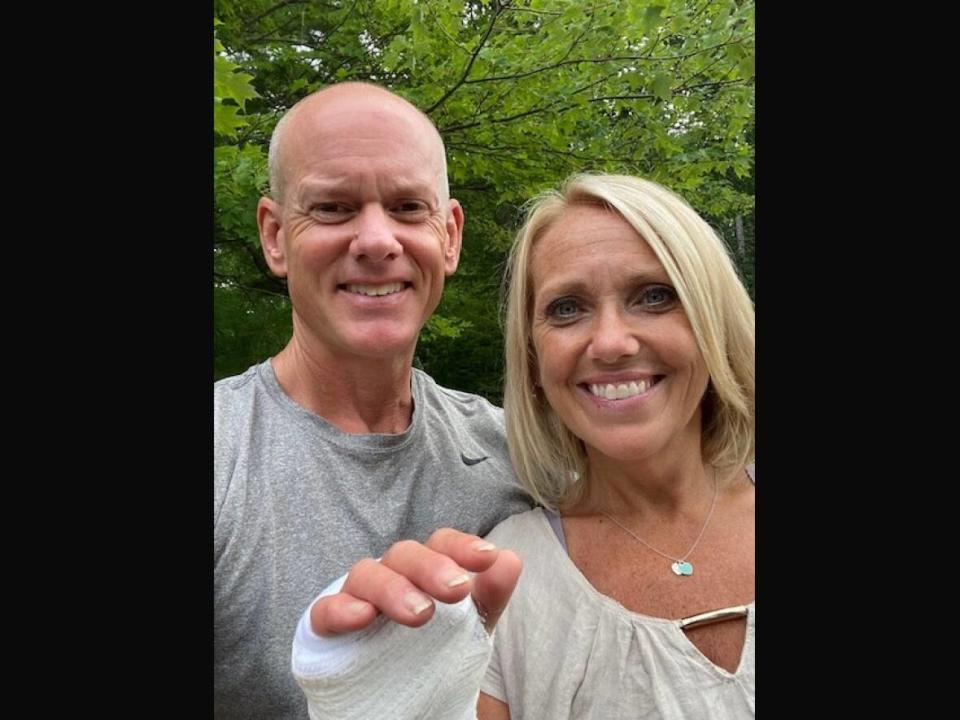Cape Breton riverbank accident renews calls for rural cellphone service

An outdoor mishap during a Margaree River fishing trip has left a Lunenburg County family wondering about the lack of cellphone coverage in rural Cape Breton.
Andrew MacAdam of Conquerall Mills, N.S., had planned a summer vacation to the Margaree Valley after taking up the sport of flying fishing.
Last Saturday, the college instructor and his family were at pool in the Northeast Margaree River, near Big Intervale, known for its trout population and swimming.
MacAdam and another man were casting lines, while MacAdam's daughter and wife were enjoying the summer heatwave and watching the scenery.
MacAdam later heard his daughter calling for help after his wife slipped.
"She got caught up in the rocks and lost her balance and she fell over," MacAdam said. "Where we were located on the riverbank, it was just too precarious to try to get her up to the vehicle, to try to transport her ourselves to the hospital."
No cell service
MacAdam said his wife was dizzy and confused, so he wasn't sure if she had hit her head. They later found out she had broken her wrist.
"I knew I was going to need help. I tried to call 911 and there were no bars on my phone. I had to run up onto the road and then make my way up and down the road — and holding my phone — to try to see if I could get at least one bar."
It took 15-20 minutes and four phone calls before the family was able to get a hold of a 911 dispatcher.
MacAdam praised the care from the area's health-care workers and first responders, but worries what may have happened if his wife's injuries had been worse.
"She was not seriously injured, you know, thank goodness. But had it been more serious — you don't want to play hindsight — but in trying to get a connection, would those minutes count?"
MacAdam said he had no signal on the 45-minute drive to a nearby hospital in Inverness.
But that comes as no surprise to Blair Phillips, local councillor for Inverness County. Phillips said there is no coverage within the area except in little pockets.
Dead zones

And he says it's just one of many dead zones that can be found in rural Nova Scotia.
"It's been an ongoing thing for quite a while now. Nothing seems to be done about it. I don't see any movement toward that end."
Nova Scotia's emergency management office said it could not comment on cellular dead zones because they are beyond their control.
But they said they encourage anyone enjoying the outdoors to be prepared for emergencies should an accident occur.
'Nobody's providing service'
Allan MacMaster, MLA for Inverness and Nova Scotia's deputy premier, has been a longtime advocate for province-wide cell coverage.
MacMaster said in the past he's approached the Canadian Radio-television and Telecommunications Commission, which regulates telecommunications across the country.
"They suggested that competition would solve the matter, but as we know, nobody's providing service in the area to begin with," he said.
MacMaster said although there is currently no plan in place — a potential exists for the province and the federal government to join forces and work together.
MacAdam said that having access to cellphone coverage makes an area safer for residents and tourists alike.
"This is a big public safety issue beyond the convenience of having a cell phone," he said.
"We've got big problems in a lot of things in this province that we need to be addressed but public safety, you know it's quite important."
MORE TOP STORIES

 Yahoo Movies
Yahoo Movies 